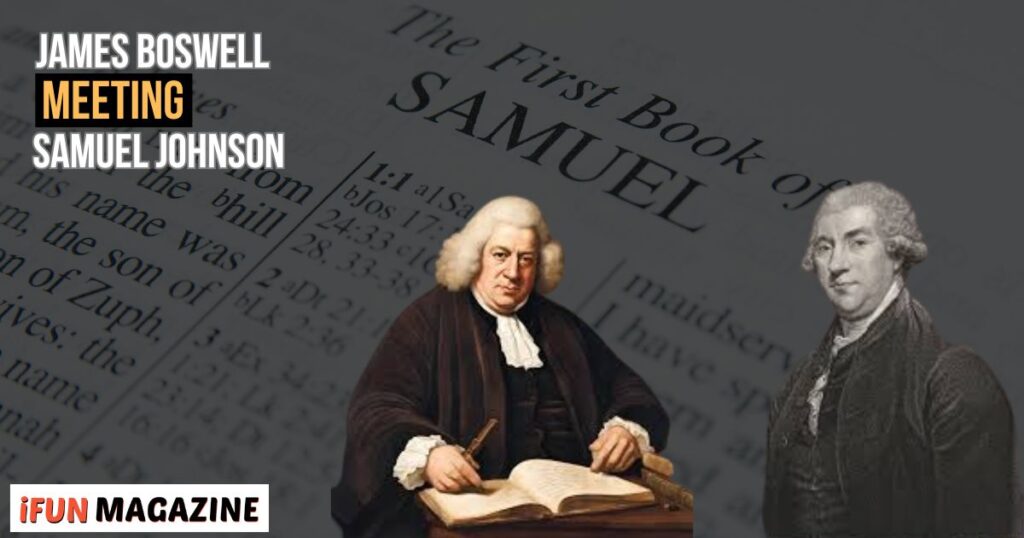James Boswell, a well-known Scottish diarist and biographer born in Edinburgh in 1740, is renowned for his extensive biography of the famous English writer Samuel Johnson, “Life of Samuel Johnson,” which stands as the most fantastic biography in English. Boswell’s detailed diaries, letters, and papers were rediscovered in the 20th century. Yale University published them, boosting Boswell’s posthumous reputation significantly.
Boswell played a crucial role in shaping the art of biography. His detailed narrative style profoundly influenced how biographies were written. He combined rich character sketches with vivid, firsthand observations, making his biographies engaging and insightful. Studying Boswell’s legacy is crucial even today, aiding understanding of biography’s evolution. His works highlight the importance of personal observation and detailed documentation. They remain timeless resources for aspiring writers and historians.
Early Life and Background
On the crucial Day of October 29, 1740 (N.S.), Boswell was born in Edinburgh. Blair’s Land, next to St. Giles’ Cathedral in Edinburgh’s Parliament, was the site of his birth. Alexander Boswell, Lord Auchinleck, was his father and a respected Scottish judge. Euphemia Erskine, his mother, was a devoted Calvinist with strict principles. As the first son, Boswell was heir to their estate in Ayrshire. Despite his inheritance, Boswell faced a challenging family dynamic. He perceived his father as cold and distant, affecting their bond.
At five, Boswell attended James Mundell’s Academy for advanced education. He excelled in English, Latin, writing, and arithmetic. However, the environment seemed unhappy, creating nightmares and shyness in the young boy. Removing him from the academy, his family sought private tutors for his education. A notable tutor, John Dunn, exposed Boswell to contemporary religion and literature. Dunn guided him through his ailments, fostering his love for writing and reading.
Boswell frequently battled personal struggles like shyness and illness in his youth. Kay Jamison suggests he may have had bipolar disorder, affecting his moods. This condition often imposed challenges during different phases of Boswell’s life. Despite trials, he found calm in socializing and travelling to new places. Boswell’s recovery from illness in Moffat introduced him to high society. This experience likely sparked his interest in exploring the broader world.
Biography of James Boswell
| Category | Details |
| Full Name | James Boswell, 9th Laird of Auchinleck |
| Birth | October 29, 1740, Edinburgh, Scotland |
| Death | May 19, 1795, London, England |
| Best Known For | Biography of Samuel Johnson, Life of Samuel Johnson |
| Family | Eldest son of Alexander Boswell, Lord Auchinleck, and Euphemia Erskine; married to Margaret Montgomerie, with whom he had four sons and three daughters |
| Education | Attended University of Edinburgh and University of Glasgow |
| Occupations | Biographer, Diarist, Lawyer |
| Major Influence | Samuel Johnson |
| Notable Works | Life of Samuel Johnson, The Journal of a Tour to the Hebrides, Account of Corsica |
| Early Life | Born in Edinburgh, educated by private tutors, educated in English, Latin, writing, and arithmetic. Suffered from bipolar disorder. First exposure to society at Moffat. Enrolled at the University of Edinburgh and the University of Glasgow, underwent depressive episodes, and ran away to London before being brought back to Scotland. |
| Grand Tour and European Travels | I passed the law exam in 1762, made friends with Samuel Johnson in 1763, and undertook the Grand Tour from 1764 to 1766, traveling through Germany, Switzerland, Italy, Corsica, and France. Met European intellectuals and reported to London newspapers. |
| Professional Life |
Law Studies and Early London Life
On July 30, 1762, Boswell passed his oral law exam successfully. His father, pleased with the accomplishment, raised his allowance to £200 annually. This financial boost allowed Boswell to return to London with spirits high. He kept an exacting record in London, eventually published in the “London Journal” in 1950.
Full of enthusiasm, Boswell met Samuel Johnson for the first time on May 16, 1763. Their friendship was immediate, with Johnson becoming a mentor and a parental figure. Boswell humorously records their first exchange, highlighting Johnson’s wit. Boswell remarked about his Scottish origin, unable to change it. Johnson replied witty, pointing out that many Scots could not change that.
Boswell departed England for Europe on August 6 to further his legal studies. He aimed to expand his horizons at Utrecht University. Initially unhappy, he eventually enjoyed his time there among prominent families. Boswell fell for Isabelle de Charrière, a vivacious Dutchwoman, his social and intellectual superior. On June 18, 1764, Boswell set out from Utrecht on an adventurous Grand Tour.
He explored Germany, Switzerland, Italy, Corsica, and France, leaving lasting impressions. Boswell met European intellectuals like Jean-Jacques Rousseau and Voltaire, enriching his views. George Willison painted his portrait in Rome, marking Boswell’s presence in art. In Corsica, Boswell admired the resistance leader Pasquale Paoli and sent reports home. His diaries from this period were compiled into “Boswell in Holland” and “Boswell on the Grand Tour.”
Meeting Samuel Johnson: A Turning Point

The 1763 meeting with Johnson considerably changed Boswell’s life path. Johnson captivated Boswell with his insightful ideas and expansive knowledge. They quickly developed a bond with Johnson, a mentor to Boswell. Boswell saw Johnson as a guide, deeply respecting his wisdom and experience.
Johnson’s mentorship influenced Boswell’s writings, enriching his biographical style significantly. Boswell travelled with Johnson, shaping his perspective on many subjects profoundly. These journeys allowed Boswell to gather material and inspiration for his writings. Through Johnson, Boswell met notable figures and broadened his social circle.
Boswell’s travels with Johnson improved his confidence and understanding of human nature. These experiences refined Boswell’s skills, making him a distinguished biographer later. Their relationship provided Boswell with a foundation for his literary success.
Mastermind of Biography: The Life of Samuel Johnson
The Life of Samuel Johnson is regarded as a masterpiece in the biographical genre. Boswell innovated by including direct conversations he recorded with Johnson in his journals. His writing style broke away from facts alone, offering personal and vivid anecdotes.
Boswell portrayed Johnson as a complex and intimate figure, which was uncommon in biographies at the time. Readers of the time received more humanized details than they were used to. Boswell’s work demonstrates a unique narrative style that captures historical and personal depth. His ability to observe and document reflected his talent and dedication to authenticity.
Critics like Macaulay claimed Boswell’s openness made his biography exceptionally detailed and engaging. Carlyle believed Boswell’s keen observation provided depth and richness to his writing. Boswell exhibited dramatic skill in presenting Johnson’s personality and experiences in life. The Life of Samuel Johnson remains a valuable historical resource and a pioneering biography.
Challenges and Criticism
Boswell’s flaws and biases attracted significant criticism from his contemporaries. Critics pointed to his frequent indulgence in alcohol and gambling, which hindered his reputation. His relationships with women were contentious, often sparking gossip and moral disapproval. Despite his respect for Johnson, Boswell’s writings occasionally revealed his biases and perspectives. Balancing admiration for Johnson while asserting his individuality was difficult for Boswell.
Critiques often mentioned his romanticized views, reflecting personal prejudices over impartial observation. Navigating societal hurdles, he faced resistance due to his personal lifestyle choices. Professionally, Boswell encountered the challenge of being seen as lightweight in literary circles. Nonetheless, his humour and genuine nature earned him support and lifelong friendships. Overcoming these hurdles required Boswell to strive for acceptance and recognition continually. His ability to persist reflected his underlying strength and determination against criticism.
James Boswell’s Timeless Legacy

James Boswell redefined biography by introducing a personal and conversational writing style. His techniques presented subjects as complex, intimate individuals, making biographies engaging and relatable. Boswell’s work inspired future biographers to include personal anecdotes and direct dialogues. His detailed accounts offered readers a vivid glimpse of 18th-century life and society.
Boswell’s writings preserved his time’s intellectual and cultural landscape for future generations. His biography of Samuel Johnson remains a benchmark in documenting literary figures’ lives. Boswell constantly pushed boundaries with his authentic and innovative narrative techniques.
His ability to capture personalities with emotional depth had a lasting influence. Biographers and writers still reference Boswell’s methods for their dynamic storytelling qualities today. Boswell’s legacy continues to shape literary approaches to character depiction and historical accuracy.
Lessons from Boswell’s Life
Boswell’s curiosity allowed him to explore different cultures and ideas. He observed people intensely and documented their personalities and stories. His observations provided valuable insights and enriched his biographical narratives. Boswell demonstrated the importance of attention to detail in storytelling.
Boswell faced criticism for his life choices but remained focused on his writing. He managed to balance his flaws with his talent and creativity. Despite challenges, he stayed dedicated to capturing biographical truths and experiences. His perseverance through criticism highlighted his commitment to achieving literary success.
Boswell embraced authenticity in his writing, presenting real and complex human experiences. He captured his subjects’ flaws and virtues, making them relatable. Boswell’s approach showed the importance of honesty in storytelling. His work set a standard for genuine portrayals in biographical writing.
Conclusion
James Boswell significantly shaped the field of biography through innovative narrative techniques. He introduced personal anecdotes and dialogues, making biographies more engaging and relatable. His approach to storytelling influenced future writers to capture personalities with emotional depth. Boswell’s works preserved 18th-century life, offering insights into historical and cultural landscapes. His book, The Life of Samuel Johnson, remains a respected cornerstone in literature today.
Boswell’s contributions continue to inspire modern literary studies and biographical methods. His emphasis on authenticity in writing encourages a truthful portrayal of human complexity. Scholars often explore Boswell’s works to understand the evolution of documenting lives in literature. Readers gain a deeper appreciation of historical figures through Boswell’s vivid and detailed portrayals. For those interested in literature, reading Boswell’s writings offers valuable lessons in narrative craft.
FAQs
What is James Boswell most famous for?
James Boswell is most famous for writing The Life of Samuel Johnson. This groundbreaking biography offers a detailed look into Johnson’s life and era. His style significantly influenced future biographers and writers.
Did Boswell and Johnson have a relationship?
Yes, James Boswell and Samuel Johnson shared a close friendship. They met in 1763 and often travelled together. Boswell deeply admired Johnson’s intellect and character. Their relationship significantly influenced Boswell’s detailed biography of Johnson.
How old was Boswell when he met Johnson?
James Boswell was 22 when he first met Samuel Johnson in 1763. Their encounter marked the beginning of a lasting friendship. Boswell’s youth brought a fresh perspective to their relationship and later biographies.
What is Boswell from Sherlock Holmes?
Boswell is not a character in Sherlock Holmes stories. However, in these stories, Dr. Watson sometimes jokingly references Boswell. Watson compares his role to Boswell’s with Johnson, which underscores Watson’s dedication to documenting Holmes’ adventures.
How did Boswell influence future biographies?
James Boswell influenced future biographies by using detailed anecdotes and dialogue. He presented people as complex individuals with depth. His approach to writing was both innovative and engaging. Boswell’s influence is evident in the narrative style of later biographers.




